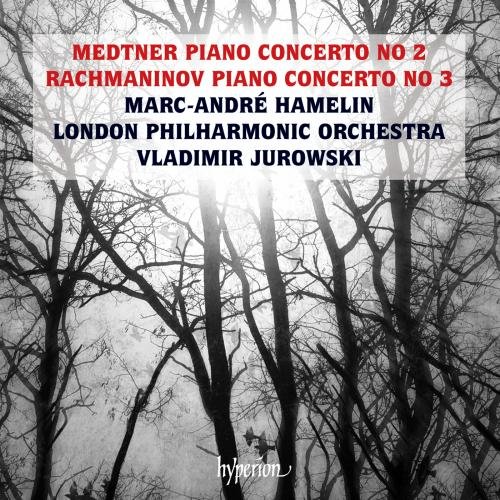MEDTNER; RACHMANINOV Piano Concertos
View record and artist detailsRecord and Artist Details
Composer or Director: Marc-André Hamelin, Nikolay Karlovich Medtner, Sergey Rachmaninov
Genre:
Orchestral
Label: Hyperion
Magazine Review Date: 04/2017
Media Format: CD or Download
Media Runtime: 82
Mastering:
DDD
Catalogue Number: CDA68145

Tracks:
| Composition | Artist Credit |
|---|---|
| Concerto for Piano and Orchestra No. 2 |
Nikolay Karlovich Medtner, Composer
London Philharmonic Orchestra Marc-André Hamelin, Composer Nikolay Karlovich Medtner, Composer Vladimir Jurowski, Conductor |
| Concerto for Piano and Orchestra No. 3 |
Sergey Rachmaninov, Composer
London Philharmonic Orchestra Marc-André Hamelin, Composer Sergey Rachmaninov, Composer Vladimir Jurowski, Conductor |
Author: Jeremy Nicholas
Medtner’s Op 50 is an extraordinarily tricky assignment for both pianist and conductor but both here and in the Rachmaninov there is a palpable and invigorating rapport between Hamelin and Jurowski. The former is presented with a relentless thicket of notes and few passages of respite; without sight of a score or the pianist, the listener can have little idea of just how difficult the piano part is. The latter has to deal with the tricky coordination of constantly fluctuating rhythms, figurations and tempos with twists and turns that come faster than a Scalextric track, such is the profusion of Medtner’s ideas.
Few can illuminate or clarify complex textures quite as well as Marc-André Hamelin and no pianist past or present understands Medtner’s idiom better (his recording of the complete sonatas is likely to remain the benchmark). Obviously in vastly superior sound, this is a recording that stands beside the composer’s classic account (with the Philharmonia under Issay Dobrowen in 1947 which, however, and unlike Hamelin’s, takes Medtner’s own suggested cut of 45 bars in the cadenza) and is better recorded than Nikolai Demidenko’s compelling 1991 performance on the same label and with the same producer (4/92), coupled with Medtner’s less approachable Third Concerto.
As to Hamelin’s Rach Three, there are parts that quite swept me away and parts that felt slightly disengaged and routine. Take the very opening, played at a laidback minim=56 (as opposed to the composer’s urgent 72). It sounds rather dour. While some may feel the piano is a tad too dominant in the balance, it allows one unusually to hear the intricate writing in scrupulously observed detail. If Hamelin can occasionally resemble someone who likes a drink but is determined to remain sober, there are passages aplenty where he digs deep for a reading of powerful emotion. Hear how he handles the great central climax of the first movement and its cadenza (the shorter of the two), and with what relish the seasoned chamber musician responds to the woodwind soloists in the Intermezzo. The finale storms home in suitably triumphant fashion. Nevertheless, the concerto’s overall timing of 43'11" is surprisingly slow, closer to the young Ashkenazy with Fistoulari than to Janis with Munch or Dorati, Wild with Horenstein and Hough with Litton, all round about the 35'00" to 37'00" mark. The disc has a playing time of 82'09".
Discover the world's largest classical music catalogue with Presto Music.

Gramophone Digital Club
- Digital Edition
- Digital Archive
- Reviews Database
- Full website access
From £8.75 / month
Subscribe
Gramophone Full Club
- Print Edition
- Digital Edition
- Digital Archive
- Reviews Database
- Full website access
From £11.00 / month
Subscribe
If you are a library, university or other organisation that would be interested in an institutional subscription to Gramophone please click here for further information.




